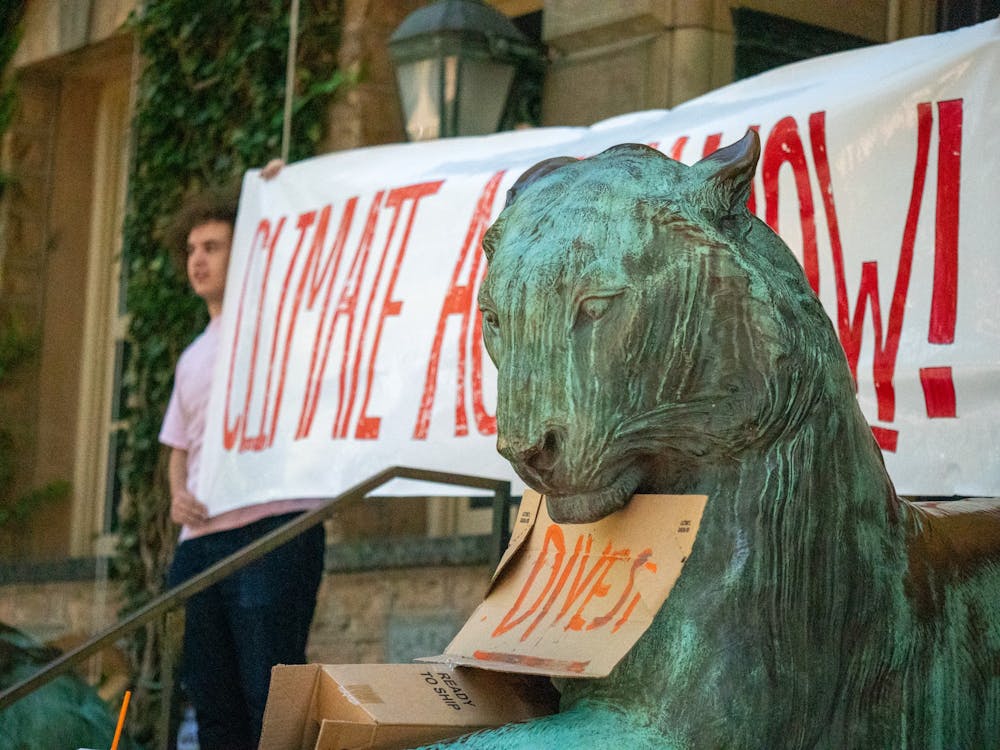Last Friday, Divest Princeton held a sit-in in front of Nassau Hall advocating for urgent and complete divestment from the fossil fuel industry.
Students gave speeches, painted signs, and sat on blankets doing homework during the event, which lasted four hours. Many of them were local high schoolers skipping class to attend.
Harmonie Ramsden, a senior at Princeton High School, was there with her sister Keegan. She was missing multiple classes by attending the sit-in on Friday afternoon, but said in an interview with The Daily Princetonian that she believes in the cause.
“I might miss an assignment, but in the long run, advocating for climate action is more important,” she said.
Ramsden said there has been a local group organizing climate strikes since she was a freshman; they used to leave at lunchtime on Fridays and rally at Hinds Plaza, but the COVID-19 pandemic put their events on hold.
Now, many of their organizers have graduated and entered college. Martin Mastnak ’25 helped organize strikes at Princeton High School starting in 2019, and is now involved with Divest Princeton as a college student. He expects there to be multiple events like the sit-in throughout the semester.
“An event like this is sending a clear message to [President Christopher] Eisgruber and the Trustees that we as students and members of a generation inheriting an earth that’s already been greatly harmed won’t stand for investment in fossil fuels,” he said.
Harvard recently announced it would allow its remaining indirect investments in fossil fuels to expire, which some, such as Nate Howard ’25, see as a sign that complete divestment is possible for the University.
The fact that other schools like the University of Cambridge and Rutgers University have already divested “makes Princeton look bad. We’re really dropping the ball,” Howard said.
Howard explained that he thinks the information released about the University’s dissociation plan has been “very vague and intentionally confusing.”
Last May, the Board of Trustees announced that the University would dissociate from the thermal coal and tar sands segments of the fossil fuel industry, as well as companies that promote climate misinformation. The Board also announced it would set a target date to achieve net-zero greenhouse gas emissions in the University portfolio.
Following a “series of conversations with internal and external experts” on dissociation, a panel of faculty has been formed to advise the University on how to determine which companies fall into the categories previously described by the Board as warranting dissociation.

The Faculty Panel on Dissociation Metrics, Principles, and Standards — which includes professors with expertise in environmental studies, ethics, economics, public policy, and engineering — will produce a written report for University decision-makers, and will be encouraged to update the broader community periodically while its work is in progress.
“An administrative committee will use the findings of the faculty panel to propose for Board approval a set of actionable criteria for dissociation and a process for implementing them, now and in the future,” according to a University web page.
In response to the protest, Deputy University Spokesperson Michael Hotchkiss explained the University’s divestment policies went beyond what the Council of the Princeton University Community (CPUC) recommended.
“It’s important to note that the Trustees used recommendations from the CPUC as the basis for their deliberations leading up to the May announcement, ultimately adopting a set of policies that are more aggressive than those recommendations and grounded in Princeton’s history as a world leader in conservation and climate science research,” Hotchkiss wrote in an email to the ‘Prince.’
Still, students within Divest Princeton have expressed frustration with the pace of action. This administrative committee aims to complete its work by the end of the academic year.
“We need a more urgent timeline,” said Hannah Reynolds ’22, Co-Coordinator of Divest Princeton. “Nothing’s changing. They’re not actively divesting, just continuing to review.”
Reynolds is a Senior Columnist for the ‘Prince.’
Events like the sit-in help keep pressure on the University by “reminding the administration that we’re still here and not going away,” Reynolds said.
Howard also said he sees it as a kick-off function for the semester, and said he hopes it helps get first-years and sophomores engaged with Divest Princeton.
Paige Cromley is a sophomore who writes for the News, Features, and Arts & Culture sections of the ‘Prince.’ She can be reached at pcromley@princeton.edu.








